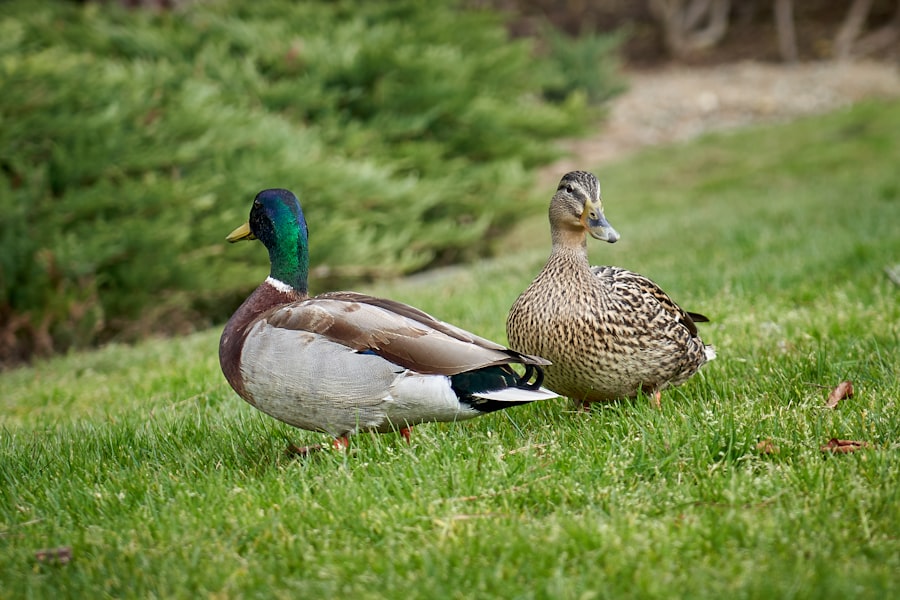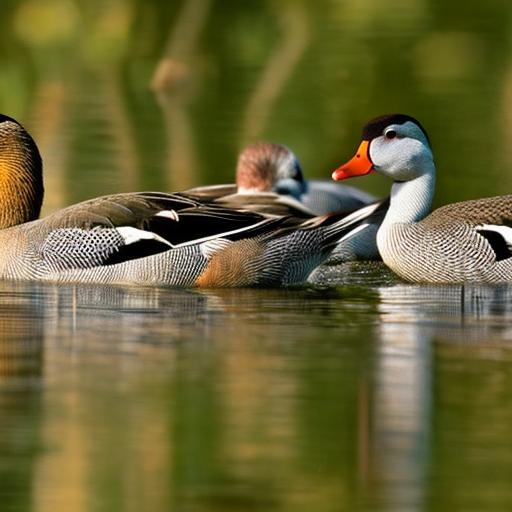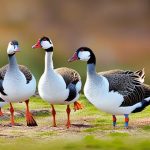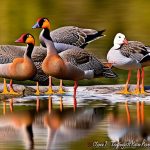Feeding ducks and geese can be a delightful experience for both children and adults alike. There is something magical about being surrounded by these beautiful creatures as they eagerly gobble up the food you provide. However, in order to ensure a successful feeding session, it is important to understand the behavior of ducks and geese. By doing so, you can create an environment that is conducive to their feeding habits and avoid any potential issues that may arise.
Key Takeaways
- Geese and ducks have different feeding behaviors and preferences
- Choosing the right feeder for ducks can prevent geese from accessing it
- Geese are likely to feed in open areas near water sources
- Decoys can be used to deter geese from the duck feeder
- Installing barriers and using natural repellents can keep geese away from the feeder
Understanding the behavior of geese and ducks
Ducks and geese have different feeding habits that are influenced by their natural instincts. Ducks are dabbling birds, which means they feed by tipping their heads underwater and grazing on aquatic plants, insects, and small fish. They are also known to forage on land for seeds and grains. On the other hand, geese are grazers that primarily feed on grasses and grains found in open fields or near bodies of water.
Understanding these behaviors is crucial when it comes to feeding ducks and geese. For example, if you are feeding ducks, it is important to provide them with a variety of food options such as cracked corn, peas, or lettuce. Ducks also prefer shallow water where they can easily reach the food. Geese, on the other hand, prefer open spaces with ample grass or grain supply. By understanding their behavior, you can create a feeding environment that caters to their specific needs.
Choosing the right feeder for ducks
When it comes to feeding ducks, there are several types of feeders available on the market. One popular option is a floating feeder that can be placed in a pond or lake. These feeders are designed to keep the food dry while allowing ducks to easily access it. Another option is a ground feeder that can be placed on land near water sources. These feeders are ideal for attracting ducks that prefer to forage on land.
The best feeder for ducks ultimately depends on the specific needs of the ducks in your area. If you have a pond or lake nearby, a floating feeder may be the best option. However, if you notice that the ducks in your area prefer to forage on land, a ground feeder would be more suitable. It is important to observe the behavior of the ducks and adjust your feeding strategy accordingly.
Identifying the areas where geese are likely to feed
Geese are commonly found near bodies of water such as lakes, ponds, or rivers. They are attracted to open spaces with ample grass or grain supply. If you are looking to feed geese, it is important to identify these areas in order to maximize your chances of attracting them.
One way to identify areas where geese are likely to feed is by observing their behavior. Geese often leave behind droppings in areas where they have been feeding. Look for large concentrations of droppings near bodies of water or open fields. These areas are likely to be frequented by geese and would be ideal for setting up a feeder.
Using decoys to deter geese from the duck feeder
Geese can sometimes be a nuisance when it comes to feeding ducks. They are known to dominate feeding areas and scare away other birds. One effective way to deter geese from the duck feeder is by using decoys. Decoys are lifelike replicas of geese that can be placed near the feeder to create the illusion of a larger flock.
The effectiveness of decoys depends on how realistic they look and how well they are positioned. It is important to place the decoys strategically in order to create a sense of safety for the ducks while deterring geese from approaching the feeder. Experiment with different positions and observe how the birds react. Adjust the placement of the decoys as needed until you find a configuration that works best.
Installing barriers to keep geese away from the feeder

Another effective way to keep geese away from the duck feeder is by installing barriers. There are several types of barriers available that can be used to create a physical barrier between the geese and the feeder. One option is a fence or netting that can be placed around the feeder to prevent geese from accessing it. Another option is a motion-activated sprinkler system that sprays water when geese approach.
When installing barriers, it is important to consider the behavior of the geese. Geese are large birds that can easily fly over or walk around obstacles. Therefore, it is important to choose barriers that are tall enough or wide enough to effectively deter them. It may also be necessary to reinforce the barriers periodically to ensure they remain effective.
Implementing a feeding schedule for ducks
Creating a feeding schedule for ducks is important for several reasons. First, it helps establish a routine for the ducks, which can make them more comfortable and less stressed. Second, it ensures that the ducks have access to food at regular intervals, which is important for their overall health and well-being.
When creating a feeding schedule for ducks, it is important to consider their natural feeding habits. Ducks are most active during early morning and late afternoon, so it is best to schedule feedings during these times. It is also important to provide a variety of food options to ensure a balanced diet. Finally, be consistent with the feeding schedule and avoid overfeeding, as this can lead to health issues.
Providing alternative feeding options for geese
While it is important to deter geese from the duck feeder, it is equally important to provide them with alternative feeding options. This helps ensure that all birds have access to food and reduces competition and aggression.
One option is to set up a separate feeder specifically for geese in an area away from the duck feeder. This feeder can be filled with grains or grasses that are preferred by geese. Another option is to scatter food in open fields or near bodies of water where geese are commonly found. This allows geese to forage naturally while reducing their reliance on the duck feeder.
Using natural repellents to discourage geese
Natural repellents can be an effective way to discourage geese from accessing the duck feeder. There are several natural substances that geese find unpleasant and will avoid. One example is grape extract, which can be sprayed around the feeder to create a barrier that geese will not cross. Another option is to plant certain types of vegetation that geese find unappealing, such as tall grasses or prickly shrubs.
When using natural repellents, it is important to reapply them regularly, especially after rain or heavy dew. It is also important to consider the safety of other birds and animals that may come into contact with the repellents. Choose repellents that are safe and non-toxic to ensure the well-being of all wildlife in the area.
Consistently monitoring the feeder to prevent geese from accessing it
Consistently monitoring the feeder is crucial in preventing geese from accessing it. Geese are intelligent birds that can quickly adapt to changes in their environment. They may find ways to bypass barriers or overcome deterrents if they are not consistently monitored.
Regularly check the feeder for any signs of geese or other unwanted visitors. If you notice any activity, take immediate action to deter the geese and reinforce any barriers if necessary. By consistently monitoring the feeder, you can ensure that it remains a safe and inviting space for ducks while deterring geese.
Seeking professional help for persistent geese problems
In some cases, persistent geese problems may require professional help. If you have tried various deterrents and barriers without success, it may be time to seek assistance from a wildlife management professional. These professionals have the knowledge and experience to effectively address geese issues and provide long-term solutions.
When seeking professional help, it is important to choose a reputable and experienced wildlife management company. They will assess the situation, develop a customized plan, and implement strategies to deter geese from the feeding area. They may also provide ongoing monitoring and maintenance to ensure the effectiveness of their solutions.
Feeding ducks and geese can be a rewarding experience, but it is important to understand their behavior in order to ensure successful feeding. By choosing the right feeder, identifying feeding areas, using decoys and barriers, implementing a feeding schedule, providing alternative options, using natural repellents, consistently monitoring the feeder, and seeking professional help when needed, you can create a safe and inviting environment for ducks while deterring geese. Enjoy the joy of feeding ducks and geese while being mindful of their behavior and needs.
If you’re struggling with keeping geese out of your duck feeder, you might find this article on Poultry Wizard helpful. It provides valuable insights and tips on how to tackle this issue effectively. Additionally, if you’re interested in learning more about duck mating season, check out this informative article on the same website. And for those who are into chicken farming, there’s a great article on chicken coop portage that offers practical advice. Lastly, if you’re considering breeding turkeys, Poultry Wizard has an article dedicated to the mating season for turkeys. Happy reading and happy farming!
FAQs
What is the problem with geese and duck feeders?
Geese are known to be aggressive and territorial birds that can scare away ducks and other waterfowl from their feeding areas. This can lead to a shortage of food for the ducks and other birds.
What are some ways to keep geese out of the duck feeder?
There are several ways to keep geese out of the duck feeder, including using a feeder with a smaller opening that only allows smaller birds to access the food, placing the feeder in an area that is difficult for geese to access, or using a decoy predator to scare the geese away.
What are some natural deterrents for geese?
Some natural deterrents for geese include planting tall grasses or shrubs around the feeding area, using reflective surfaces to disorient the geese, or using noise-making devices like wind chimes or bells.
What are some non-lethal methods to control geese populations?
Non-lethal methods to control geese populations include using visual deterrents like decoys or flags, using noise-making devices like air horns or sirens, or using trained dogs to chase the geese away.
What should I do if geese continue to be a problem?
If geese continue to be a problem, it may be necessary to contact a professional wildlife control service to help manage the situation. It is important to remember that geese are protected under federal law, and it is illegal to harm or kill them without a permit.
Meet Walter, the feathered-friend fanatic of Florida! Nestled in the sunshine state, Walter struts through life with his feathered companions, clucking his way to happiness. With a coop that’s fancier than a five-star hotel, he’s the Don Juan of the chicken world. When he’s not teaching his hens to do the cha-cha, you’ll find him in a heated debate with his prized rooster, Sir Clucks-a-Lot. Walter’s poultry passion is no yolk; he’s the sunny-side-up guy you never knew you needed in your flock of friends!







